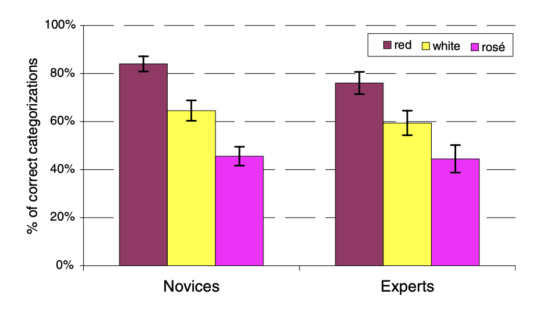
Would it please you to know that you may well be a better judge of wine than you imagine? That you — casual, untrained, occasional wine drinker that you are— may even, in some contexts, perform as well as a bona fide expert?
There’s at least one serious study of such things that says you probably could. It involves a single test: accurately determining the color of wine (red, white, or pink) with just a sniff. No peeking and no tasting.
The study I cite was undertaken in 2009, in France, by a team from the University of Burgundy and published in the Journal of Chemosensory Perception.* I originally stumbled on it while preparing one of the radio spots I was doing for America’s Test Kitchen around that time.
For that segment, your correspondent brought six opaque black wine glasses into the WGBH studios, surreptitiously poured a few ounces of red, white or rosé wine into each, and challenged host Christopher Kimball to say what kind (color) each glass held. He could both sniff and taste.
The task set to the participants in the University of Burgundy experiment was more difficult, since subjects could only sniff the wine, not taste it. The subjects consisted of three panels: one of “experts” (winemakers, teachers in oenology schools or wine researchers, all frequent wine drinkers); one of “trainees” (a group that had an average of 16 months of wine tasting education); a third of “novices” (people with no formal wine tasting experience whatever and infrequent wine drinkers).
The subjects proved surprisingly adept at sorting reds from whites by smell alone (rosés proved more problematic); but the real eye-opener here is the performance of the novice panel compared with the experts. As you can see from the graph above, the know-nothings vanquished the know-somethings (by a nose, you might say). One has to wonder how such an outcome is possible.
I don’t have a clear answer to this, but I have something to offer. It’s that having a lot of experience at anything puts you on your guard against quick-draw judgments, alerts you to the possibilities for error, prepares you to encounter anomalies and the areas where one category imperceptibly shades into another, teaches caution. Add to these the expert’s fear of being shown up, and you have a recipe for hesitation and doubt.
Novices, on the other hand, are blissfully free of such hobbles, and thus perhaps more likely to just roll with their instincts, unencumbered by an overwrought thought process.
Speaking of experts, I know for a fact that there isn’t anyone involved with wine either in the trade, or as a journalist or critic, or even someone who actually makes the stuff who hasn’t at one time or another been embarrassed, caught out, made to look foolish or downright dense by it.
In truth, wine has embarrassed me more times that I care to count — to the point I became convinced that wine had it in for me. But I’ve changed my mind.
The occasional humiliation comes with the territory.